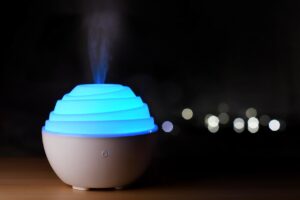Diffusers are a popular tool for aromatherapy enthusiasts. They help to disperse essential oils into the air, creating a therapeutic environment that promotes relaxation and wellness.
However, one of the most common complaints about diffusers is that they don’t produce enough mist. If you’re looking for ways to increase the mist output of your diffuser, you’re in the right place.
In this article, we’ll show you how to unlock the secret to more mist from your diffuser.
Understanding Your Diffuser
Before we dive into the tips, it’s important to understand how diffusers work. There are four main types of diffusers: ultrasonic, nebulizing, heat, and evaporative.
Ultrasonic diffusers are the most popular and use high-frequency vibrations to break down essential oils into tiny particles that are then dispersed into the air.
Nebulizing diffusers use air pressure to create a fine mist of essential oils, while heat diffusers use heat to vaporize essential oils.
Evaporative diffusers use a fan to blow air through a pad or filter that has been soaked in essential oils.
Factors that influence the mist output of your diffuser include the type of diffuser, the size of the room, the humidity levels, and the quality of the essential oils used.
Tips to Increase Mist Output
- Choose the Right Essential Oils: Not all essential oils are created equal. Some oils are thicker and heavier than others, which can affect the mist output of your diffuser. For maximum mist output, choose essential oils that are thin and watery, such as citrus oils or peppermint.
- Clean Your Diffuser Regularly: Over time, essential oils can build up in your diffuser and clog the misting mechanism. To prevent this, clean your diffuser regularly with water and a mild detergent. Be sure to follow the manufacturer’s instructions for cleaning your specific model.
- Add Warm Water to Your Diffuser: Warm water can help to increase the mist output of your diffuser. Before adding essential oils, fill your diffuser with warm water and let it run for a few minutes to warm up the mechanism.
- Increase the Airflow in Your Room: The more airflow in your room, the more mist your diffuser will produce. Open a window or door, turn on a fan, or use a humidifier to increase the humidity levels in the room.
- Use Distilled Water for Better Results: Hard water can leave mineral deposits in your diffuser, which can affect the mist output. To prevent this, use distilled water instead of tap water.
Benefits of Increased Mist Output
Increasing the mist output of your diffuser can have several benefits. First, it can enhance your aromatherapy experience by creating a more potent and long-lasting scent.
Second, it can improve the air quality in your room by adding moisture to the air. Finally, it can promote better sleep by creating a relaxing and calming environment.
FAQs
There are several reasons why your diffuser might not be producing enough mist. It could be due to a clogged misting mechanism, low water levels, or thick essential oils.
To make your diffuser more powerful, try adding warm water, cleaning it regularly, increasing the airflow in the room, and using thin essential oils.
If you can barely smell your diffuser, it could be due to the type of essential oils used or the size of the room. Try using more potent essential oils or moving the diffuser to a smaller room.
To get the most out of your essential oil diffuser, use high-quality essential oils, clean it regularly, add warm water, and increase the airflow in the room.
Yes, you can put too much water in a diffuser. Overfilling the diffuser can damage the device and reduce the mist output.
A diffuser mists by using high-frequency vibrations or air pressure to break down essential oils into tiny particles that are then dispersed into the air.
Putting too much oil in a diffuser can clog the misting mechanism and reduce the mist output. It can also be overwhelming and cause headaches or other adverse reactions.
It’s best to place the diffuser at a medium height in the room to ensure even mist distribution.
It’s best to replace the water in your diffuser every 24 hours to prevent the growth of bacteria or mold.
Using tap water in a diffuser can leave mineral deposits and reduce the mist output. It’s best to use distilled water instead.
Yes, you can run your diffuser with just water, but it won’t produce any scent. You need to add essential oils to create a therapeutic environment.
The number of drops of oil you should use in a diffuser with water depends on the size of the diffuser and the potency of the essential oils. As a general rule, start with 3-5 drops and adjust as needed.
Conclusion
If you’re looking to increase the mist output of your diffuser, there are several tips you can try.
Choose the right essential oils, clean your diffuser regularly, add warm water, increase the airflow in your room, and use distilled water.
By following these tips, you can unlock the secret to more mist from your diffuser and enjoy the maximum benefits of aromatherapy.
